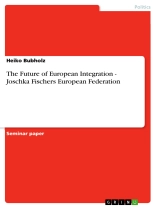Seminar paper from the year 2002 in the subject Politics – Topic: European Union, grade: 1, 0 (A), Jagiellonian University in Krakow (Centre for European Studies), course: History and Theory of European Integration, language: English, abstract: Now, in January 2002, a visible step in European integration has been accomplished. With the introduction of the European €-currency about 296, 8 millions citizen1 of the European Union will hold the new symbols of the unity of Europe’s peoples in their hands. What began with an attempt of reconciliation and co-operation via the ECSC in 1952 has now developed towards a so far unprecedented transfer of sovereign rights and competencies from nation-states to a supranational/intergovernmental organisation.
Helmut Kohl, former chancellor of Germany and one of the initiators of the European currency, ascertains that the process of integration thus became irreversible. Though currently limited to a number of Member States of the EU, the “European experiment” attained a new dimension. Spectators, – in the words of Kohl – passing the streets and places of Kraków, Prague or Budapest, may notice and experience there the European spirit as well. Hence, Europe shall not be limited in its today’s proportions. The historical and moral – as well as rational – obligation of the EU therefor has to be the accession of the Candidate Countries in the earliest possible occasion2.
This, however, implies the Union’s ability – and will – to cope with its own process of deepening and widening. During the IGC of Nice, European statesmen tried to negotiate a somehow reformed structure able to adopt an enlarged Union. Though not ratified yet, the Treaty of Nice will provide the future EU with means in the spirit of Maastricht and Amsterdam. Yet, Jacques Delors himself declared that the treaty establishing the European Union would for sure not become a part of fine literature. Drafted by lawyers it is, according to Delors, hard to understand without a manual3. This makes the problems evident, which the European idea is faced today. Though proclaimed to be a revolutionary step forward, the amendments of the Nice Treaty in effect do only barely “continue the process of creating an ever closer union among the peoples of Europe”4.
[…]
______
1 Bundesverband deutscher Banken (2001), p. 12-13.
2 Kohl (2001).
3 Delors (1993), p. 4: „Zweifellos wird dieser Vertrag [Vertrag von Maastricht] nicht in die Literaturgeschichte eingehen. Ohne genaue Gebrauchsanweisung ist er schwer zu verstehen. Er ist das Ergebnis vielfacher Kompromisse und von Juristen geschrieben“.
4 Preamble of the Treaty on the European Union.
Heiko Bubholz
The Future of European Integration – Joschka Fischers European Federation [EPUB ebook]
The Future of European Integration – Joschka Fischers European Federation [EPUB ebook]
Mua cuốn sách điện tử này và nhận thêm 1 cuốn MIỄN PHÍ!
Ngôn ngữ Anh ● định dạng EPUB ● Trang 41 ● ISBN 9783638133890 ● Kích thước tập tin 1.0 MB ● Nhà xuất bản GRIN Verlag ● Thành phố München ● Quốc gia DE ● Được phát hành 2002 ● Phiên bản 1 ● Có thể tải xuống 24 tháng ● Tiền tệ EUR ● TÔI 3480870 ● Sao chép bảo vệ không có












